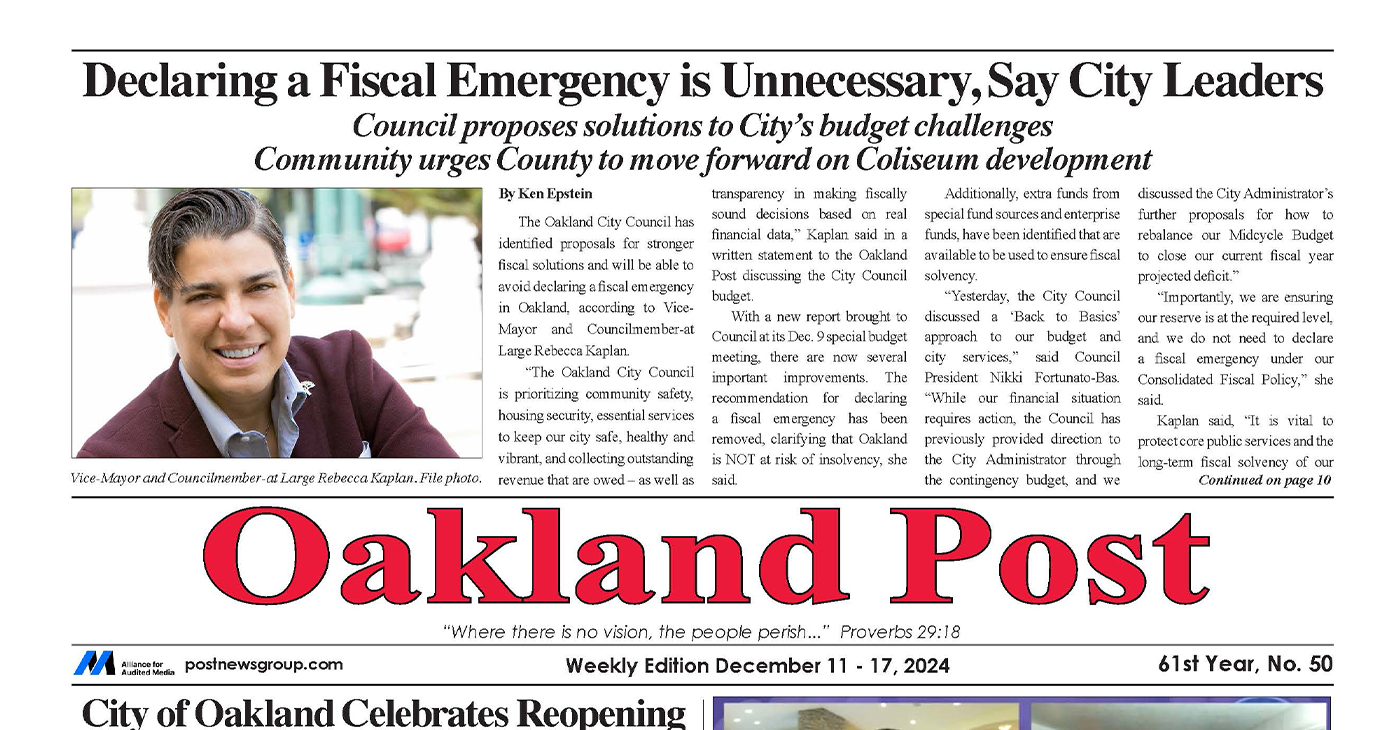Opinion
OP-ED: Mr. President, Come to Ferguson
Ferguson is too important to be treated on the margins. It is too important to lead the news one day, and disappear the next.
The shooting of Michael Brown in Ferguson, the police response to the demonstrations that followed, the horror of a clearly biased prosecutor driving a grand jury to fail to make an indictment — all this isn’t simply about Ferguson.
There is a Ferguson in every metropolitan area of America.
At times, a single incident throws a powerful light on a reality. Ferguson is one of those times.
And to ensure that this reality is not simply discussed in passing, but dealt with, elevated to the top of the national agenda, President Obama should come to Ferguson.
In 1965, one week after the police riot that greeted peaceful demonstrators trying to cross Edmund Pettus Bridge in Selma, Ala., Lyndon Johnson addressed a joint session of Congress, calling on them to pass the Voting Rights Act, and making the electric promise that “we shall overcome.”
Johnson knew that the Selma horrors exposed a reality that could no longer be ignored. It was time to act.
In 1967, after riots broke out in cities across the country, Johnson convened a commission headed by Illinois Governor Otto Kerner with a mandate to probe the causes of the riots and recommend actions so that these tragedies would not be repeated.
The Kerner Commission’s conclusion — that we were moving toward “ two societies, one white and one black, separate and unequal” — captured the nation’s attention. The commission concluded that African Americans saw the police as an occupying force, dispatched to protect the privileges of whites, and insensitive to the protection of the minority community’s lives or rights.
It found that disparate underlying conditions providing the kindling that could be sparked by incidents at any time, and that these conditions were present across the country, including racially segregated communities, scarred by inferior schools, high unemployment, inadequate public services from public transport to parks to hospitals.
The Commission called for action, and demanded that it be accompanied by a budget sufficient to make the necessary changes. The growing war in Vietnam squelched those hopes.
Twenty-four years later, after Los Angeles riots that followed acquittal of the four white policemen in the beating of Rodney King ended in 60 deaths and a billion dollars of damages the Christopher Commission was created to probe the causes, finding that not much had changed.
The country cannot afford neglect for another quarter century. It is time to act. President Obama should come to Ferguson.
He should lay out the structural realities that lie exposed in the wake of the shooting of Michael Brown — and that are common to cities across the country. He should demand action on an agenda for reviving these communities, and rebuilding trust and hope.
A high level commission, chaired by distinguished bipartisan leadership, could probe the conditions that produce that shooting and others like it across the country.
Its focus should be less on the behavior of police and more on the conditions of the community. It should assess the system of criminal injustice, but go beyond to the structural realities that create Fergusons.
Its report should be clear and pointed; its reform agenda comprehensive, with a budget attached. The president should include that in his next budget, and call on Congress and the country to act.
Ferguson, like Selma, exposes injustice that has been building for years.
The president’s engagement can make Ferguson, like Selma, a spur for long overdue reform. The risks of failure are great. The first African American president has understandable reluctance to challenge the country on civil rights or on the rights of Black communities.
His cautious speech after the prosecutor’s announcement of the grand jury decision reflected that.
But the risks were great when Eisenhower dispatched the troops to Little Rock to enforce school desegregation.
They were great when Johnson promised to overcome in his speech on Voting Rights after Selma. Leadership involves taking risks.
And the costs of acting, even if the Congress refuses to act, are far less than the costs of moving on from Ferguson until the next child is shot, and the next impoverished and isolated community erupts.
Activism
Oakland Post: Week of December 11 – 17, 2024
The printed Weekly Edition of the Oakland Post: Week of December 11 – 17, 2024

To enlarge your view of this issue, use the slider, magnifying glass icon or full page icon in the lower right corner of the browser window. ![]()
Activism
Oakland Post: Week of December 4 – 10, 2024
The printed Weekly Edition of the Oakland Post: Week of December 4 – 10, 2024, 2024

To enlarge your view of this issue, use the slider, magnifying glass icon or full page icon in the lower right corner of the browser window. ![]()
Activism
COMMENTARY: PEN Oakland Entices: When the News is Bad, Try Poetry
Strongman politics is not for the weak. Here in the U.S., Donald Trump is testing how strongman politics could work in the world’s model democracy.

By Emil Guillermo
As the world falls apart, you need more poetry in your life.
I was convinced on Tuesday when a weak and unpopular president of South Korea — a free nation U.S. ally — tried to save himself by declaring martial law.
Was it a stunt? Maybe. But indicative of the South Korean president’s weakness, almost immediately, the parliament there voted down his declaration.
The takeaway: in politics, nothing quite works like it used to.
Strongman politics is not for the weak. Here in the U.S., Donald Trump is testing how strongman politics could work in the world’s model democracy.
Right now, we need more than a prayer.
NEWS ANTIDOTE? LITERATURE
As we prepare for another Trump administration, my advice: Take a deep breath, and read more poetry, essays and novels.
From “Poetry, Essays and Novels,” the acronym PEN is derived.
Which ones to read?
Register (tickets are limited) to join Tennessee Reed and myself as we host PEN OAKLAND’s award ceremony this Saturday on Zoom, in association with the Oakland Public Library.
Find out about what’s worth a read from local artists and writers like Cheryl Fabio, Jack Foley, Maw Shein Win, and Lucille Lang Day.
Hear from award winning writers like Henry Threadgill, Brent Hayes Edwards and Airea D. Matthews.
PEN Oakland is the local branch of the national PEN. Co-founded by the renowned Oakland writer, playwright, poet and novelist Ishmael Reed, Oakland PEN is special because it is a leader in fighting to include multicultural voices.
Reed is still writing. So is his wife Carla Blank, whose title essay in the new book, “A Jew in Ramallah, And Other Essays,” (Baraka Books), provides an artist’s perspective on the conflict in Gaza.
Of all Reed’s work, it’s his poetry that I’ve found the most musical and inspiring.
It’s made me start writing and enjoying poetry more intentionally. This year, I was named poet laureate of my small San Joaquin rural town.
Now as a member of Oakland PEN, I can say, yes, I have written poetry and essays, but not a novel. One man shows I’ve written, so I have my own sub-group. My acronym: Oakland PEOMS.
Reed’s most recent book of poetry, “Why the Black Hole Sings the Blues, Poems 2007-2020” is one of my favorites. One poem especially captures the emerging xenophobia of the day. I offer you the first stanza of “The Banishment.”
We don’t want you here
Your crops grow better than ours
We don’t want you here
You’re not one of our kind
We’ll drive you out
As thou you were never here
Your names, family, and history
We’ll make them all disappear.
There’s more. But that stanza captures the anxiety many of us feel from the threat of mass deportations. The poem was written more than four years ago during the first Trump administration.
We’ve lived through all this before. And survived.
The news sometimes lulls us into acquiescence, but poetry strikes at the heart and forces us to see and feel more clearly.
About the Author
Emil Guillermo is a journalist and commentator. Join him at www.patreon.com/emilamok
-

 Activism4 weeks ago
Activism4 weeks agoOakland Post: Week of November 20 – 26, 2024
-

 California Black Media3 weeks ago
California Black Media3 weeks agoCalifornia to Offer $43.7 Million in Federal Grants to Combat Hate Crimes
-

 Activism4 weeks ago
Activism4 weeks agoAn Inside Look into How San Francisco Analyzes Homeless Encampments
-

 Black History3 weeks ago
Black History3 weeks agoEmeline King: A Trailblazer in the Automotive Industry
-

 California Black Media3 weeks ago
California Black Media3 weeks agoCalifornia Department of Aging Offers Free Resources for Family Caregivers in November
-

 California Black Media3 weeks ago
California Black Media3 weeks agoGov. Newsom Goes to Washington to Advocate for California Priorities
-

 Activism3 weeks ago
Activism3 weeks agoOCCUR Hosts “Faith Forward” Conference in Oakland
-

 #NNPA BlackPress4 weeks ago
#NNPA BlackPress4 weeks agoPRESS ROOM: Clyburn, Pressley, Scanlon, Colleagues Urge Biden to Use Clemency Power to Address Mass Incarceration Before Leaving Office
























































